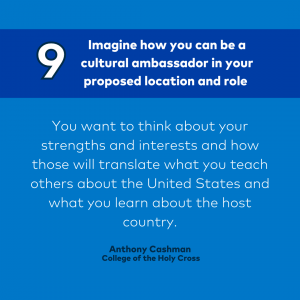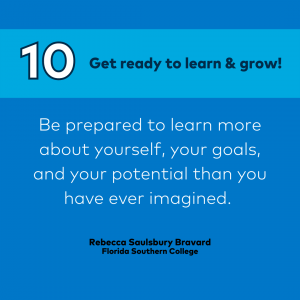Applying for a Fulbright award might seem like a daunting task. However, it doesn’t have to be! We asked Fulbright Program Advisors from the latest cohort of Top Producing Institutions—schools that had the highest number of U.S. Fulbrighters for the 2021-22 academic year—to give some advice to prospective applicants. Use the tips below to craft a memorable proposal.
The Fulbright U.S. Student Program’s 2023-24 competition is now open! Learn more about how to apply.

Do not self-select out and not apply. Let the national selection committee or the in-country committee decide if you are not the right fit. And if you do not end up getting a Fulbright, you were not “rejected.” Your application simply wasn’t selected this time around. We all apply for far more things than we end up getting–do not give up!
—Monica Cable, Franklin & Marshall College

Sincerely express your unique self–each sentence should be a sentence that could only have been written by you.
—Jennifer Armstrong, Scripps College

Think deeply about where you want to spend your Fulbright year, and be as specific as possible in describing your preparation for the opportunity, your goals in applying, and the reasons for your choice of host country. Specificity is the mark of an excellent, compelling application.
—Marynel Ryan Van Zee, Carleton College

In your writing, share what is true to you (your genuine motivations, specific past achievements, and unique future goals) rather than generic statements that you think a Fulbright committee wants to hear.
—Jennifer Locke, Occidental College

Begin your affiliation outreach as early as possible, as the best contacts you make will engage you in conversation that will influence your project proposal in exciting ways.
—Robert Strong, Bates College

Start thinking about the Fulbright Program early on, even in your freshman or sophomore years. Take advantage of the repertoire of language learning possibilities at [your university], especially those in lesser taught languages. Language skills are often key to a successful application.
—David Holmberg, Cornell University

Remember the core tenet of Fulbright–creating mutual understanding across cultures. You might have a fantastically compelling project, but if you are not able to articulate how you’ll use your Fulbright experience to immerse yourself in a new culture and make personal connections, it’s not a Fulbright project.
—Joy Campbell, Michigan State University

Connect the dots! Think about the application as a whole and really think about your “why.” Consider how Fulbright is a fit with your personal values/interests, academic and co-curricular choices, and the ways you can demonstrate that you engage with difference and work to build mutual understanding in your own community.
—Melissa Ryan, Connecticut College

Imagine how you can be a cultural ambassador in your proposed location and role. You want to think about your strengths and interests and how those will translate what you teach others about the United States and what you learn about the host country.
—Anthony Cashman, College of the Holy Cross

Be prepared to learn more about yourself, your goals, and your potential than you have ever imagined.
—Rebecca Saulsbury Bravard, Florida Southern College

